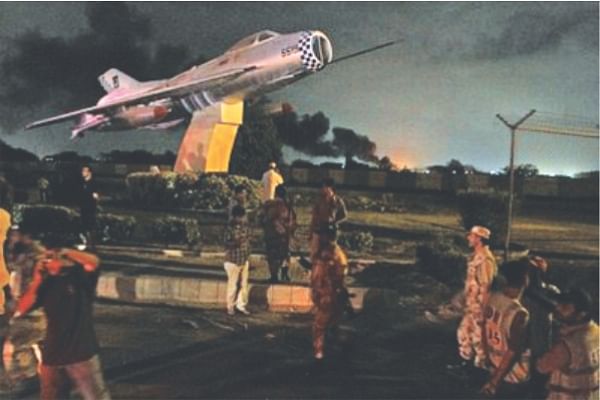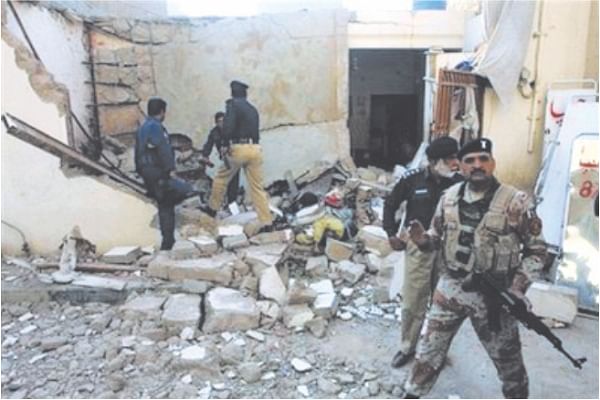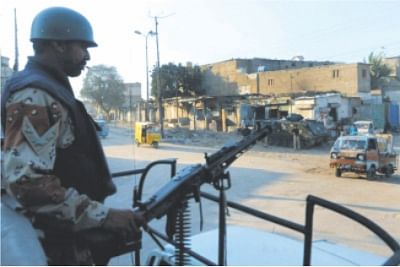| Home - Back Issues - The Team - Contact Us |
 |
| Volume 11 |Issue 23| June 08, 2012 | |
|
|
Perspective Heart of Darkness Shakhawat Liton back from Pakistan A sojurn in the 'epicentre of global terrorism' The story of Zuleikha tells us how dangerous the city is now. The 58-year old woman lost her son Islam Baloch on May 13 when Baloch was shot dead in Mochko area in Karachi. Saeed Baloch and Mujeeb Baloch, two brothers of the diseased, registered a case against unknown assailants at a local police station. They did not know that filing a case to seek justice would lead them to another tragedy. On May 16, Saeed and Mujeeb were gunned down in Gulshan-i-Mazdoor, Baldia Town in the city.
Zuleikha did not know that more danger was lurking beyond the bend. On May 18, while going to a local morgue to claim the bodies of her three sons, she came under attack and was seriously injured. Three men who were with her at that time were killed in the pre-dawn attack not far from the morgue in Federal B area. Zuleikha's case is not an isolated incident in Karachi. Rather it is just one of numerous incidents of violence and target killings. It is very difficult to find a day without the news of killing and violence. According to Moosa Kaleem, secretary of Karachi Press Club, around 6,000 people were killed in the city in the last four years. Increasing violence has given birth to a booming private security business in the city. “Over one hundred private security companies are now operating in the city,” said Moosa, also a local journalist. He said security companies were given license to provide the security personnel with sophisticated arms to ensure security of their clients in Karachi, dubbed the most dangerous city in the world. Moosa was talking to a Bangladesh media delegation at his office in the press club premises on May 18. The 10 member delegation arrived at Karachi on May 16 on a weeklong visit to Pakistan's three cities—Karachi, Lahore and Islamabad, on invitation of the Pakistan government.
Many securitymen are found standing with arms in front of shopping malls or departmental stores. Individuals are also seen to move with gunmen. Securitymen also stay with them even when they enter a restaurant to have food. Chief Minister of Sindh provincial government Qaim Ali Shah however does not agree with those who portray Karachi, the financial centre of Pakistan and capital of Sindh, as the most dangerous city in the world. “Over 15 million people live in this city. If you compare it with other cities including top cities of USA, you will find that the situation is far better than others,” the chief minister claims during a meeting with the delegation at his residence, “So far law and order situation is blown out of proportion.” Many senior journalists in Karachi echo the chief minister's opinion, blaming the western media for launching a propaganda attack against Pakistan. They say that there are many positive things in Pakistan such as a strong media and judiciary, but the Western media always report negative things to portray Pakistan as a 'failed state'. We left Karachi for Lahore on May 19 and faced a new experience. In Karachi, we moved to many places in the city without any security arrangement. Protocol officer Ahmad Bux Baloch just briefed us about the situation in the city and he tried his best to avert any untoward incident. But in Lahore, some policemen were always with the delegation wherever they went to. At midnight when two Bangladeshi journalists were leaving the hotel where they were staying, the hotel authorities sent a security man armed with sophisticated weapon to ensure their security. “We entered a shop. The security man also entered along with us. When we were talking to a shopkeeper to buy some clothes, the security-man was standing beside us like a robot with his gun,” says Saiful Anam, a member of the delegation, after his return from midnight shopping.
During the three days stay in Islamabad, special police forces escorted the Bangladesh delegation wherever they went. The law and order situation in Balochistan has deteriorated sharply. Irked by the apparent apathy of the government towards Balochistan, which is sliding into chaos, Chief Justice Iftikhar Muhammad Chaudhry on May 23 issued an ominous warning: “If the prime minister doesn't take steps to improve the law and order situation, the Constitution will declare a state of emergency.” “The judiciary is an organ of the state. It'll not allow violation of the Constitution. We want to save Pakistan,” Justice Chaudhry said while heading a three-judge bench of the apex court hearing of a case on the volatility of security situation in Balochistan. Mukhtar Aaqil, editor-in-Chief of Urdu daily Juraat, which is published from Karachi, blamed late military ruler General Zia-ul-Haq for the present crisis in Pakistan. “It was General Zia whose policy was to divide and rule. He split many Islamic organisations and political parties and patronise some of them to use against others,” Aaqil said, adding that the current sectarian conflict between Shias and Sunnis was also patronised by Gen Zia's regime. Subsequent governments, he said, followed Zia's strategy to consolidate power and to rule the country smoothly. “The situation has gone almost beyond the control," Aaqil said. In view of Rashed Rahman, editor of Daily Times published from Lahore, every time the military took over state power, they brought a new disaster for the nation. Pakistan has been described by the US as the epicentre of global terrorism. And it is very interesting to note that it is the US that has contributed largely to the deteriorating situation in Pakistan by their wholehearted support to the military rulers. Bruce Riedel, a former CIA analyst, in the Foreword of a book titled “The Future of Pakistan” writes: “For most of the last century the United States has been a partner of Pakistan's military dictators, enthusiastically embracing all four generals who have ruled Pakistan. Presidents from Kennedy to Bush have invited them to the White House for state dinners and intimate consultations.” Life goes on Despite frequent violent incidents, killings, security threat, the city dwellers in Karachi come out of homes en mess, even at midnight, to go to the cinema. When new films—English or Hindi–get released, finding tickets even at midnight shows is difficult. In Lahore, many city dwellers with their family members are seen even at midnight in the roadside food stalls. Many people are seen sitting by the side of the streets and chatting under open sky. The same scenario is seen at some areas in Islamabad, which is considered very expensive where poor people do not live. However, the number of tourists visiting Pakistan has drastically been reduced due to lack of security. In their political life, Pakistanis are going to achieve something momentous–the National Assembly of Pakistan is going to complete five year tenure–for the first time since the nation came into existence in 1947. And the current regime brought major constitutional reforms in efforts to consolidate the democratic process. Rashed Rahman, editor of Daily Times, says that people are hopeful for better times in the coming days if the democratic process is allowed to continue without any interference from the military. The writer is Senior Reporter, The Daily Star.
|
Copyright
(R) thedailystar.net 2012 |
 Photo: Courtesy
Photo: Courtesy Around 6,00 people were killed
in Karachi in the last four years. Photos: Courtesy
Around 6,00 people were killed
in Karachi in the last four years. Photos: Courtesy